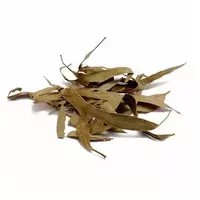Eucalyptus leaves

Eucalyptus or Eucalyptus is an evergreen tree as well as a shrub that belongs to the Myrtle family. The eucalyptus plant received its scientific name due to its appearance. The word eucalyptus comes from the Greek phrase ευκάλυπτος, which literally means "with a beautiful cap. "
Eucalyptus species
A tree or eucalyptus shrub, as a rule, does not exceed 100 meters in height. The trunk of the eucalyptus is straight and covered with a substance of natural origin, the so-called gum. The crown of the eucalyptus tree is distinguished by its spherical or weeping shape. In principle, the appearance of the plant depends primarily on the vil of eucalyptus. Currently, science knows over 700 species of a plant such as eucalyptus.
Eucalyptus species differ in appearance, as well as bark and crown forms. Eucalyptus blooms in inflorescences in the form of an umbrella. Eucalyptus or achene fruits are boxes that are somewhat similar to acorns. Eucalyptus forests are native to Australia and New Zealand. Some eucalyptus species are native to the Philippines, and in addition to Indonesia.
Eucalyptus is distributed on the European and American continents, and also grows in the Russian Federation. People have been using the unique properties of eucalyptus for a long time. As a rule, eucalyptus leaves are used, which are processed in various ways. The distinctive properties of eucalyptus make it possible to find a fairly wide application for the plant.
Eucalyptus leaves are dried and also used as natural raw materials for obtaining essential oil. For culinary purposes, eucalyptus leaves are used as a spice, as well as essential oil, which acts as a drug. The benefits of eucalyptus lie in the chemical composition of the plant. Most often, dried eucalyptus leaves are used as a spice in recipes for Asian national cuisine.
The benefits of eucalyptus
The main benefit of eucalyptus lies in the plant's unique disinfecting and anti-inflammatory properties. Eucalyptus leaves are used to make various infusions, which are successfully used in folk medicine. In addition, eucalyptus leaves are used in the pharmacological industry.
Typically, eucalyptus is part of painkillers and antimicrobials. From the leaves of eucalyptus, you can brew invigorating and warming tea, which can raise the tone of the human body. In addition to the benefits, there is also the harm of eucalyptus, which, by the way, can manifest itself only if the simplest precautions are violated.
The harms of eucalyptus
Eucalyptus can harm people who suffer from individual intolerance to the plant. In any case, before you start using eucalyptus leaves for culinary, preventive or therapeutic purposes, it is better to consult your doctor first.
eucalyptus leaves 0.1 kCal
Energy value of eucalyptus leaves (Ratio of proteins, fats, carbohydrates - ju):
Proteins: 0 g (~ 0 kCal)
Fats: 0 g (~ 0 kCal)
Carbohydrates: 0 g (~ 0 kCal)
Energy ratio (b | y): 0% | 0% | 0%
 Español
Español Français
Français Português
Português Русский
Русский 简体中文
简体中文 繁體中文
繁體中文 日本語
日本語 한국어
한국어 العربية
العربية Türkçe
Türkçe Қазақ
Қазақ Deutsch
Deutsch Italiano
Italiano Українська
Українська
